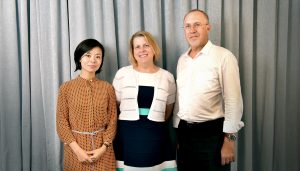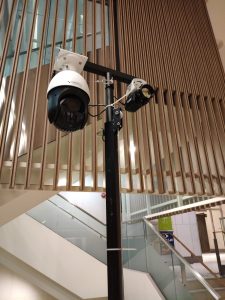-
One Story Every Day
To encourage parents make the most of their time with their children, Prof. Catherine McBride (Department of Psychology) and her social enterprise Cayan Educational Design are now introducing the “One Story Every Day” campaign. The stories were developed based on results from research studies involving thousands of children. Making compound words, either real or creative, is important for improving children’s vocabulary knowledge and reading skills. So in these stories, either real or creative compound words in both Chinese and English are highlighted for learning. Families are encouraged to read interactively and discuss each story together.
Check out new stories each day here!
To understand more about the philosophy behind our stories and our game (focused on developing morphological awareness, a key skill for literacy learning), click here.

Read Cayan’s literacy blog here, where where parents and teachers may find other tips on how to teach literacy and language learning to young children.
Sing along while washing your hands
Perhaps you are more familiar with Prof. Roger Chung (Jockey Club School of Public Health and Primary Care) as a singer-songwriter (in The Chung Brothers with his older brother Henry Chung), a DJ and voice actor for commercials. Just this month, he put both his areas of expertise into full use in a collaboration with Mcdull, narrating basic precautions against the virus as a public health consultant in the animated story. If only Prof. Chung also sang along with Mcdull and friends!
https://www.facebook.com/MyLifeAsMcdull/videos/648317089255176/
Coax kids to wear a mask in sign language
Prof. Gladys Tang (Department of Linguistics and Modern Languages) is our expert in sign language research and advocate for sign bilingualism. SLCO Community Resources, a social enterprise she and her team founded a few years back, has been offering bilingual training and playgroup sessions popular among parents and children alike. Though their classes are currently suspended, SLCO obtained permission to produce sign language videos based on two illustrated books (611 Bread of Life Christian Church’s I’m not afraid and Mia Lin’s Little masked soldiers) – perfect for families with hard-of-hearing members, or anyone interested in sign language.
Illustrated books (Chinese and sign language): I’m not afraid , Little masked soldiers
Video on wearing a mask
https://www.facebook.com/slco.org.hk/videos/194613911750882/
《口罩小衞兵》作者林孜育 Mia(臉書粉絲頁: MIIIA*Mia)授權「語橋」作手語傳譯
*Credits to original authors of illustrated books
Video guide for emotional wellbeing
https://www.facebook.com/slco.org.hk/videos/219511619228616/
611靈糧堂兒童教會及家庭部授權「語橋」作手語傳譯,以及使用其繪本內容作後期製作
*Credits to original authors of illustrated books, which the videos are based upon
-
Battle the epidemic of fear and fake news
Ex-media practitioner Prof. Donna Chu (School of Journalism and Communication) founded social enterprise Mars Media Academy, coaching with a creative flair how we could digest information and approach media outlets critically. That not only has something to do with your language capabilities, but also media and information literacy. Prof. Chu and her Martian team has been scrutinising news events relevant to the epidemic on their Facebook page – let’s boost our immunity towards myths and learn to read between the lines!

Great read from Mars (Chinese only): Fact Check – What to Check for?
-
Tech in action
Last month, CUHK alumnus Rex Sham (CSO of Insight Robotics) presented to the government their newly developed AI-powered temperature screening system, now up and running at Hong Kong Science Park. Previously focused on large-scale detection systems for forest fires, Insight responded swiftly to recent events with a solution that can quickly perform accurate and large-scale human body temperature screening:


- Have both thermal and visible cameras with trained detection model
- Enhanced performance (scan 7x more people) and accuracy (down to 0.2 oC) compared with existing solutions
- Can measure forehead temperature even individuals are wearing spectacles and surgical masks
- Detect multiple fever suspects within one scene, instead of spotting the object/person with the highest temperature only (currently deployed systems only measure the one with the highest body temperature)
- Automatically remove false alarms caused by non-human hot objects such as hot drinks, lunch boxes, and vehicles

